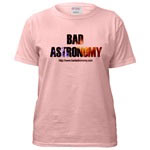
| Bad Astronomy |
|
|
|
BA Blog
|
|
Q & BA
|
|
Bulletin Board
|
| Media |
|
|
|
Bitesize Astronomy
|
|
Book Store
|
|
Bad Astro Store
|
|
Mad Science
|
|
Fun Stuff
|
| Site Info |
|
|
|
Links
|
| RELATED SITES |
| - Universe Today |
| - APOD |
| - The Nine Planets |
| - Mystery Investigators |
| - Slacker Astronomy |
| - Skepticality |
Buy My Stuff

Keep Bad Astronomy close to your heart, and help make me
filthy rich. Hey, it's either this or one of those really
irritating PayPal donation buttons here.
Even More Marilyn!
August 18, 1998I have taken Marilyn vos Savant to task on these pages before; once when I too was wrong, and another time when I am quite sure she was wrong. Sometimes it's okay to be wrong, if you have done your best to research a problem and simply come to the wrong conclusion. However, in the August 2, 1998 column published in the Parade magazine, there were plenty of references to be found, but the posted answer was still incorrect.
The questions was: "During a flight, I saw a round rainbow shaped like a doughnut. It was beautiful! What's the name for this sight?" Due to copyright considerations, I cannot quote MvS's response in its entirety. However, she said that all rainbows are actually circles, and that she could not find a name for this phenomenon.
There are a couple of problems with her answer. One is that rainbows really aren't full circles. They can be, but usually aren't. For a good explanation of how rainbows form, try this webpage, a part of the Patterns in Nature website. Basically, rainbows are due to light getting bent ("refracted") inside of raindrops. They are arcs and not circles because the raindrops are above the ground; so the circle gets cut off at the ground. If you could get into the air high enough you'd see a complete circle. The rainbow everyone sees is unique; the colors one sees and the location of the rainbow depend on where the observer stands. So rainbows are not all circles; they are really arcs. To see them as circles you need to be in a special place.
But what about what that woman saw? This is MvS's second error. It wasn't a rainbow. It's called a "glory", and is formed in a somewhat different way than rainbows. They both are due to water droplets suspended in the air, but the glory is not due to the simple refraction of light like a rainbow; the light is also "back-scattered". Light from the Sun is usually scattered in the air (which is why the sky appears blue). However, under certain conditions, that light may be scattered preferentially in one direction. It's like a pinball moving through a pinball machine; the ball gets scattered in lots of directions when it hits the bumpers, but since the board is tilted, that scattering usually is downward. A glory has light scattered back towards you, and so it makes the area where the glory appears look brighter than the surrounding area. Even better, the shadow of the airplane usually appears in the center of the glory, since you are looking in the opposite direction of the Sun. All in all, this is a beautiful and astonishing sight, and the next time you're in an airplane, keep your eyes open for it.
Anyway, back to Ms. Savant: she says she could not find any references to the phenomenon, but I wonder. If you see something weird in the sky, such as a pattern of lights like a rainbow, who would you ask for advice? My first thought would be to ask a meteorologist, someone who studies atmospheric phenomena. Why didn't she do that? Someone with a weekly column (and at least one book to her name) should have been able to find this information. For example, I looked up rainbows and glories on the web, and found a reference to the book "Light and Color in the Outdoors" by M. Minnaert (Springer Verlag, 1993). That's a good book, and if you can find it it's worth a look.
Note (February 14, 1999): Bad Reader Drake Christensen informs me that fighter pilots are very aware of glories. They call them "sunballs", and since by definition they are in the anti-sunward direction, they are useful in dogfights. If you put your enemy in the middle of a sunball, then from their view you are in the Sun, and they cannot see you. The advantage is obvious!
|
|
|
|